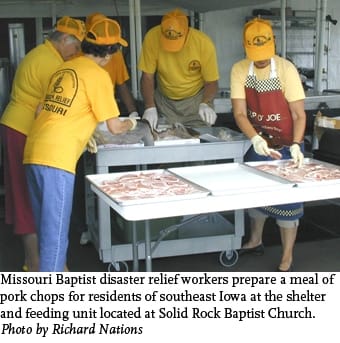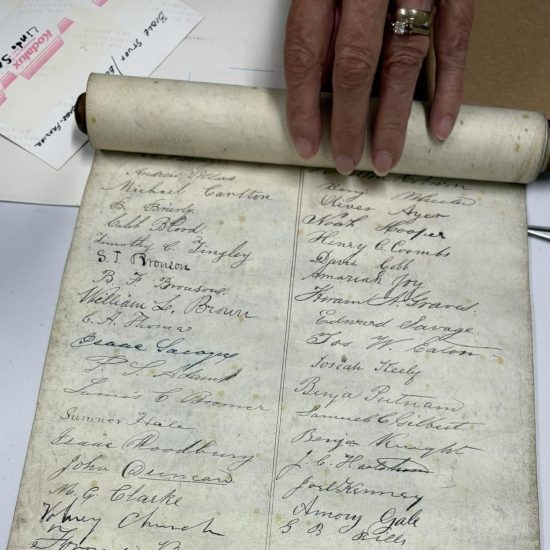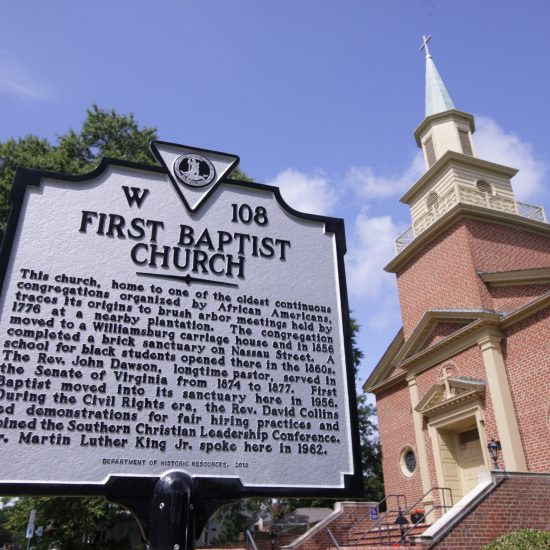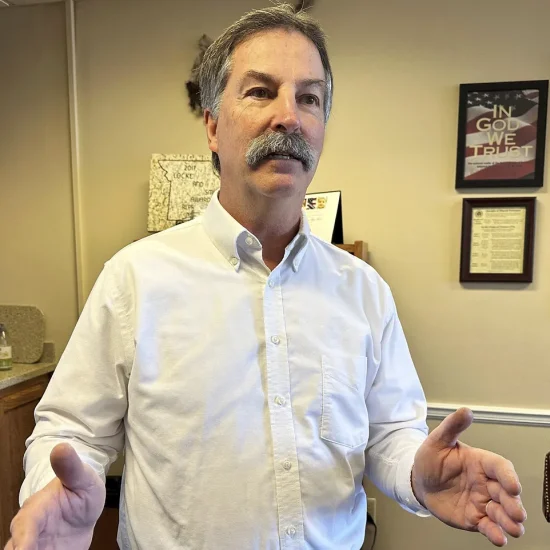By Jennifer Harris
Word&Way News Writer
As flood waters begin to recede across the Midwest, home and business owners are left with the task of mudding-out and rebuilding. Baptists across the country are partnering to make sure those tackling such efforts aren’t alone.
 “The devastation is awful,” said Richard Nations, publications editor for The Iowa Baptist. “The smell of mold and decaying plants is overpowering in some places where the flood waters have come up and gone back down. The houses and their contents are ruined or at least damaged beyond belief. Most flooded neighborhoods are piled up with soggy, moldy contents of homes….”
“The devastation is awful,” said Richard Nations, publications editor for The Iowa Baptist. “The smell of mold and decaying plants is overpowering in some places where the flood waters have come up and gone back down. The houses and their contents are ruined or at least damaged beyond belief. Most flooded neighborhoods are piled up with soggy, moldy contents of homes….”
Hannibal-LaGrange College is among those that have taken steps to help flood victims and secure flood areas in the Hannibal community. The school is providing housing for members of the National Guard, who were transported to Hannibal to patrol the levee. The National Guard members are staying in the newly-constructed Secker Fieldhouse and in the campus’ quadraplex apartments.
“We’re grateful that people like the National Guard members are able to come into town and help us with the protection of the levees,” Woodrow Burt, president of HLG, told a reporter from the Hannibal Courier-Post. “This is one of the ways we can reach out to that group and to the community to help.”
HLG is also allowing both personal and commercial vehicles and tractor trailers to park on its lots. “We currently have tractor trailers transported from businesses in Hull, Ill., that have been compromised, as well as a shuttle pick-up/drop-off for businesses and assistance groups on Hwy. 168,” said Rhonda Hufty, director of public relations.
Teams of faculty, staff and students have assisted in sandbagging efforts and plan to assist with recovery.
“We have worked with our local newspaper, the Hannibal Courier-Post, whose offices are located in the downtown riverfront area, to establish a contingency plan in case of HCP evacuation,” Hufty said.
“The HCP has been offered computer labs, offices and classroom space to set up newspaper operations on the HLG campus.”
According to a North American Mission Board report, the first stage for Baptist mud-out teams is “to comb the neighborhoods, assess damage and field requests from homeowners…. Then the crew begins removing furnishings, tearing out drywall, soaked carpets and baseboards.”
While many have considered the flooding to be the “Katrina of the Midwest,” Charles Ray, U.S. disaster response coordinator for the Cooperative Baptist Fellowship points out differences.
“It is most unusual to find a basement in Louisiana, Alabama or Mississippi, especially along the coast,” he said. “However, there are 25,000 basements in Rapid City [Iowa]. Even after the streets were dry, the basements are still full of water. Heating units, freezers of rotting food and other toxic agents make this recovery quite different from Katrina.”
The CBF is partnering with the American Baptist Churches USA to provide long-term relief. “The initial work will be done by the ABC crews using Hazmat suits and heavy duty respirators,” Ray said.
“This will be a long term effort and CBF will step up to the task and make a difference in the live of those with the greatest needs and least resources.”
Southern Baptists, including disaster relief teams from the Missouri Baptist Convention, are already doing mud-out work in parts of the Midwest.
“Right now there are shower trailers and mud-out units working in Des Moines, Cedar Rapids and Wapello,” Nations said of the work in Iowa. “I think there is a possibility that some will be moved to Ottumwa, Iowa City and Cedar Falls as well. In some cases, the water is still too high.
“The mud-out teams have been very evangelistic as they work on the homes,” he said. “In Des Moines, three people have been saved this past week with the mud-out crews leading their homeowners to faith in Jesus. We’ve been carefully collecting contact information and making sure churches are linked up with them to provide good follow-up for them.”
According to NAMB, as of June 30, Southern Baptists had worked 4,500 volunteer days; prepared more than 240,000 meals, completed 200 mud-out and chainsaw jobs, provided almost 1,300 showers for flood victims and workers, completed 436 laundry loads, and recorded 2,007 chaplaincy contacts, 17 professions of faith and other decisions, 141 gospel presentations and 763 ministry contacts.
“Please continue to pray for us,” Nations said. “We are soggy, but we are not defeated. Iowans are a tough bunch, and we will survive this flood just like we did in 1993.”






